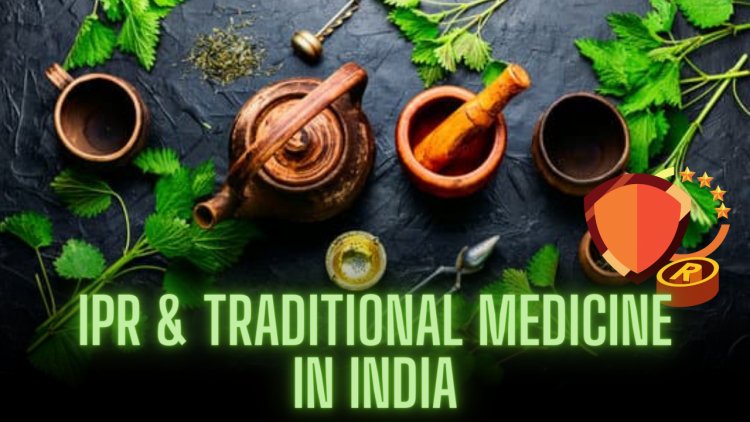Intellectual Property Rights and Traditional Medicine in India: A Complex Landscape
This article explores the intricate relationship between Intellectual Property Rights (IPRs) and traditional medicine in India. With a rich history of traditional healing systems, including Ayurveda, Siddha, and Unani, the nation faces the challenge of balancing the protection of indigenous knowledge with the principles of intellectual property. The article critically examines the existing legal framework, challenges, and opportunities in safeguarding traditional medicine through IPRs. It also discusses the implications of intellectual property on access to healthcare, cultural heritage, and the global discourse on traditional knowledge.

Introduction:
Traditional medicine has been an integral part of India's cultural and healthcare heritage. This article delves into the complex interplay between Intellectual Property Rights (IPRs) and traditional medicine, exploring how these legal mechanisms impact the preservation, promotion, and accessibility of India's traditional healing systems.
Historical Roots of Traditional Medicine in India:
A brief overview of the historical roots of traditional medicine in India, highlighting the contributions of Ayurveda, Siddha, and Unani systems. The article emphasizes the importance of these systems in shaping the nation's healthcare practices and cultural identity.
Intellectual Property Rights: An Overview:
Providing a foundational understanding of Intellectual Property Rights, including patents, trademarks, copyrights, and trade secrets. The article outlines the objectives of IPRs and their role in fostering innovation, creativity, and economic development.
The Indian Legal Framework for Traditional Medicine:
Examining the existing legal framework in India concerning the protection of traditional knowledge related to medicine. This section explores the provisions of the Indian Patent Act, 1970, and the implications for granting patents on traditional medicinal formulations.
Challenges in Protecting Traditional Medicine:
Analysing the challenges faced in protecting traditional medicine through IPRs, including issues of biopiracy, prior art, and the clash between commercial interests and the preservation of indigenous knowledge. The article discusses notable case studies and their impact on traditional medicine practitioners and communities.
Biopiracy and Traditional Knowledge Protection:
Discussing the concept of biopiracy and its implications for traditional medicine in India. The article explores the need for effective protection mechanisms to prevent the misappropriation of indigenous knowledge by foreign entities.
Access to Healthcare and Traditional Medicine:
Examining the impact of intellectual property on access to healthcare, particularly in the context of traditional medicine. The article discusses how IPRs can either facilitate or hinder the availability of affordable and culturally relevant healthcare solutions.
Cultural Heritage and Traditional Knowledge:
Exploring the link between intellectual property, cultural heritage, and traditional knowledge. The article emphasises the importance of safeguarding traditional medicine as part of India's intangible cultural heritage and the challenges in finding a balance between protection and accessibility.
Global Perspectives on Traditional Knowledge Protection:
Comparing India's approach to protecting traditional knowledge with international models and agreements. The article discusses the role of the World Intellectual Property Organization (WIPO) and other global initiatives in addressing the challenges faced by countries with rich traditional medicine practices.
Opportunities for Collaboration and Innovation:
Highlighting potential opportunities for collaboration between traditional medicine practitioners, researchers, and the pharmaceutical industry. The article discusses how a balanced approach to intellectual property can foster innovation while respecting the principles of traditional knowledge.
Conclusion:
Summarising the key findings of the article, the conclusion emphasises the need for a nuanced and culturally sensitive approach to intellectual property rights concerning traditional medicine in India. It reflects on the challenges, potential solutions, and the broader implications for the future of traditional healing systems in the country. The article concludes by advocating for a harmonious coexistence of IPRs and traditional medicine, ensuring the preservation of cultural heritage and the promotion of accessible healthcare solutions












